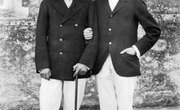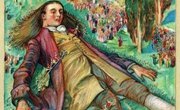Few figures are as shrouded in mystery and speculation as Christopher Marlowe. To this day, conspiracy theories regarding the Elizabethan playwright still thrive. Some believe he was a spy, murdered for political reasons. But it was more than just a secret agent England lost in 1593. As an accomplished author, Marlowe had already revolutionized English literature. Several of his plays had enjoyed great success, setting the stage for the English Renaissance and opening the door for other poets and playwrights, most notably William Shakespeare.
Forerunner to the Renaissance
Marlowe's plays embodied the worldliness and creativity now associated with the Renaissance. His "Doctor Faustus" emphasized knowledge and learning over faith and belief. "Edward the Second" addressed the fate of ineffective rulers, while "The Jew of Malta" lampooned hypocritical clergymen. The success of these works lured other writers to the theater, including Shakespeare. In fact, Shakespeare's "The Merchant of Venice" is believed to have been directly inspired by "The Jew of Malta." Additionally, "Edward the Second" is said to have influenced Shakespeare's cycle of history plays. In the end, Shakespeare may have been more prominent, but the English Renaissance was deeply indebted to Marlowe.
Related Articles
References
Resources
Writer Bio
A longtime author of lifestyle articles, Gregg Newby has written extensively on personal finance, health and wellness, fitness, education, and more. His work has been syndicated by several major news websites, including FOX, CBS, and Accuweather. Newby holds a master's degree in history and is an ardent pluviophile.











